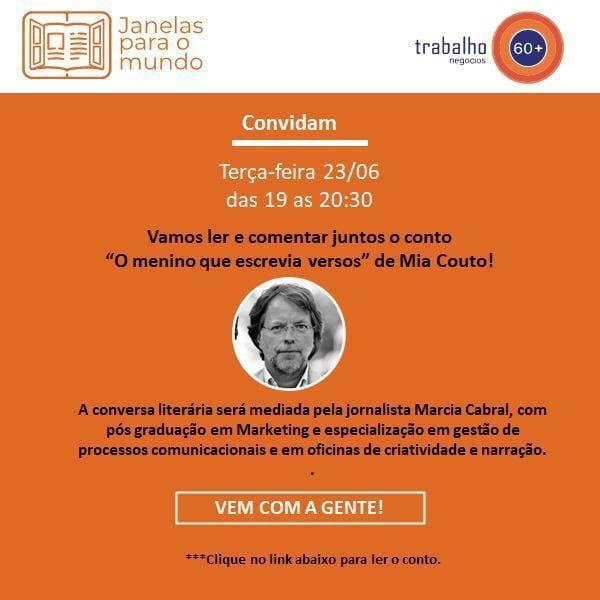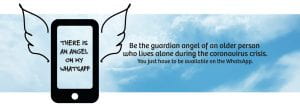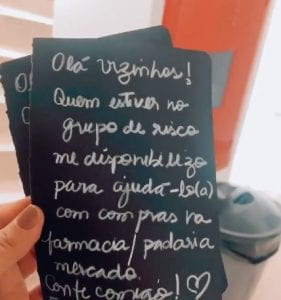No “pãodemia” for older people
By Marilia Duque E S, on 25 June 2020
“Pãodemia” is the expression used to describe the phenomenon of people baking bread (bread is “pão” in Portuguese), cakes and cookies during the quarantine that was imposed during the COVID-19 pandemic in Brazil. The expression, created by the Portuguese chef Filipa Gomes, went viral when she shared a video on her Instagram with a tutorial on how to make bread at home using just four ingredients. She named the recipe “Pãodemia”[1]. During these months of isolation, a cooking craze spread like a fever in Brazil and in other places in the world[2] as a way of avoiding leaving home, occupying one’s free time and alleviating stress. As a consequence, other than the huge rise in demand for flour in Brazil, Google registered an increase in searches for bread recipes in the country. At the end of March 2020, the number of search terms used to find bread recipes had quadrupled compared to any period in 2019[3].

Filipa Gomes’s “Pãodemia” tutorial on Instagram. Screengrab taken by the author.
The idea of turning every recipe into a pleasant activity also gained visibility on social media. People who before COVID-19 had no time to be at home or cook now share pictures of their homemade recipes, competing for distinction among peers. On my social media channels, I could see many friends my age who were chefs sharing their bread, cakes and other homemade dishes. I was also invited to a WhatsApp group called “Pandemic Kitchen”, where friends were challenged to share their creativity in cooking during the quarantine.

Directly from the oven to social media feeds. Screengrab of post shared on my Facebook timeline.
However, I observed that none of the older people I met during my 16-month ethnography in Sao Paulo were sharing any bread or cake photos. Instead, they kept sharing information they considered relevant to their peers together with all kinds of opportunities to learn new things or engage in new activities, all of which were now restricted to the online. What’s more, I also noticed they were creating many of these new opportunities.
One of the groups I studied during my research is organised around the purpose of developing new alternatives to work in old age, with the added challenge that these alternatives should combine pleasure and financial gains. To my surprise, they quickly migrated their face-to-face weekly meeting to Zoom, where they now have meetings and activities every day. Before coronavirus started, I guess like most of us, they didn’t know about Zoom. Their online activities were mainly concentrated on their Whatsapp group as well as the WhatsApp Broadcast list they use to keep the group up to date about the schedule of face-to-face activities. Although the group is focused on working and entrepreneurship, a recent survey conducted by one of the members revealed that 72% of them joined the group’s meetings to improve their sociability. This result confirmed something they already knew. Their biggest mission, as a group, is to make older people leave their homes, fighting isolation and offering a collective opportunity for them to be productive and useful. Most of the time, members make their skills available to the group and most of their initiatives address problems they face in everyday life. In other words, they are working for themselves, to improve their own experience of ageing.
When the face to face meetings were suspended, they had to move fast to avoid letting the group die. And so they did. With a professional background in collecting data through surveys, one of the members created a questionnaire using Google Docs with a portfolio of ideas for things they could do together, even at distance. The ideas people showed more interest in were transformed into their own dedicated WhatsApp groups and the respondents were automatically included according to their preferences. The most popular initiative existed even before COVID-19 – it was the “Demystifying Smartphones” workshop, created by Sergio Grinberg, aged 69. Grinberg uses his professional background working with computers to help older people to feel comfortable with their smartphones and especially with WhatsApp. However, with coronavirus, the workshop addressed what became older people’s first priority: learning how to use Zoom platform[4]. And they succeeded. As shown in their weekly schedule below, they now have activities on Zoom from Monday to Saturday.

Trabalho 60+ weekly agenda of activities on Zoom
Last Sunday, I invited the team responsible for organising these activities to a Zoom meeting, where I could get to know what they were metaphorically “cooking” better. I started by asking whether they had baked any bread, as I thought I could have missed something. They explained they had thought about an activity where they would all bake bread according to the same recipe and then donate all of it to a charity but people didn’t stick to the initiative. One of the explanations for this is that they are all focused on solving their own problems first, creating opportunities for older people to be connected and empowered. The second one is a kind of a been-there-done-that explanation. To put it in their words:
“For us, cooking became a pain in the ass. Now we are confined to being home again. But we don’t post what we are doing alone. We cook together. That is fun.”
Zoom meeting with the “Trabalho 60+” group members. Screengrab taken by the author.
Keeping doing things together – that is their spirit. In that vein, instead of posting what they consider domestic affairs, they created the Zoom event “Cooking with Friends”. Every Friday, they get online on Zoom to cook the same recipe. Each week, a different person is responsible for sharing the recipe with the ingredients and instructions, so they have time to organise themselves and get the ingredients together. During the meeting, the person sharing the recipe is also “the chef” who will guide the friends through making the recipe.

All set for the activity “Cooking with Friends”. Photo: @Eduardo Meyer
Outside the kitchen, the group is also engaged in other activities, such as organising a virtual library where they share the eBooks they have. They also have a “Janelas para o Mundo” (“Windows to the world” in Portuguese) initiative, during which they have discussions related to literature, following a dynamic similar to the one used in the “Cooking with Friends” initiative. A selected text is shared with the group and they get together once a week to have a guided discussion. People can also practice facial gym exercises on Tuesdays (they have now opened a second class, as there was huge demand for it) or join the Happy Hour meeting every Friday evening when they also celebrate the birthdays of the week. They have a choice of around 18 activities to join during the week. As there are plenty of options, people started advertising their own initiatives as they are competing for their friends’ attention. To help them, the workshop “Demystifying Smartphones” is also teaching people how to manage other applications such as Canva[5], a graphic design platform that can help them create posts for Facebook and Instagram, videos and presentations, as seen in the examples below.

Card shared on WhatsApp to promote the event “Windows to the World”. As seen on the left side on the top, the initiative even has a logo.

Card shared on WhatsApp to promote the event “Cooking with friends”.
With creativity and a pinch of professionalism, this group of older people are refusing to be confined at home. They were once confined at home, far before COVID-19 started, when they retired. Since then, they have fought hard to conquer new spaces and visibilities. Therefore, they can be confined to the online now but they are not particularly interested in bread. Instead, they are performing their miracles to multiply the opportunities they have to stay connected as a group, being productive while at the same time, sharing some of life’s pleasures together.
To get a taste of how the group “Trabalho 60+” is using Zoom platform to keep together during the quarantine, watch the video below and enjoy the experience of cooking with friends. It is mouthwatering, to say the least.
Video produced by “chef” Conrado when the taught other members of the group how to prepare the cauliflower pie.
[1] https://www.noticiasaominuto.com/fama/1453284/paodemia-a-receita-de-filipa-gomes-que-se-tornou-viral-no-instagram
[2] https://brasil.elpais.com/brasil/2020-04-09/todo-mundo-em-busca-de-receitas-de-pao-caseiro-para-amenizar-a-quarentena.html
[3] https://saude.estadao.com.br/noticias/geral,na-quarentena-assar-pao-e-bolo-ganha-espaco-e-aumenta-procura-por-farinha,70003261439
[4] https://br.vida-estilo.yahoo.com/inspiracoes-terceira-idade-sergio-grinberg-091843876.html?soc_src=community&soc_trk=fb
 Close
Close









